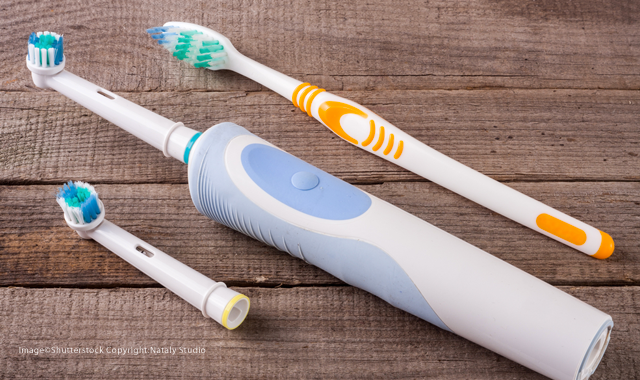Making a case for powered toothbrushes
Asking questions and reading evidence-based research can help you to make informed patient recommendations.

I have a new boyfriend, but don’t tell anyone; it’s a secret. I told Joe when we first started texting that my dad used to buy my mom a big box of Whitman’s Chocolates for Valentine’s Day, so he showed up on our first date with the biggest box from the store. Don’t tell anyone this either (especially Joe!) but I devoured most of it in less than a week. In years past, I used to give loved ones powered toothbrushes on Valentine’s Day and it was always a BIG hit. Best way to purchase a bunch of them is at a dental convention, and I’d suggest cozying up to the booth representatives in the exhibit area to get your best convention price (but again, keep it between us!)
As most of you know, I’m an advocate for evidence-based dental and dental hygiene practice and the reason I’m passionate about it is that it works in medicine. Data in medicine shows better patient outcomes when health systems use best available evidence and expertise coupled with patient values. Dentistry and dental hygiene have been slow to adopt an evidence-based approach to practice and we desperately need to catch up to medicine and nursing.
I don’t consider myself an expert in evidence-based dental practice, but I had the advantage of learning research methodology from a professor emeritus named Michele L. Darby, RDH, MS, and she instilled in me a feverish desire to ask questions and then seek answers using the scientific method. I’ve also attended several evidence-based dentistry (EBD) workshops, including the American Dental Association (ADA) EBD Champions Conference and a week-long course in EBD at the Forsyth Institute in Cambridge, Mass. In the true spirit of science, asking questions about what we read and hear in courses, magazines and journals is an attempt to make sense of opinions or positions offered by those who make patient recommendations.
Evidence to support powered toothbrushes
Encouraging questions among peers helps to bring the true spirit of science into dentistry, and the art of asking good questions is an important skill to encourage in dental practices. One of the questions that frequently comes up among peers and patients is the usefulness of powered toothbrushes and, specifically, which one is more effective. Very few hygienists and dentists I know are familiar with the research on this subject and many dental professionals still rely on the advice of colleagues, often taken at face value, or intuition. Experience is often subject to flaws and although clinical experience does matter, reliable evidence adds weight to your credibility.
In my mind, I frame a question (called a pico question) to reflect what I want to know that will benefit the patient and in this instance my question is as follows: Is there evidence that certain powered toothbrushes are superior compared to manual toothbrushes with respect to gingivitis reduction? Next, I look for good quality research and I do it according to a hierarchy (arrangement) of evidence from strong to weak according to quality, validity and applicability to patient care.1
One of my “go-to” websites for reliable information is the Cochrane Oral Health Group and I also spend a lot of time searching for evidence on the Dental Elf. Cochrane reviews are systematic reviews of primary research and they are internationally recognized as the highest standard in evidence-based healthcare resources, including oral health.
Answering my pico question was relatively easy. Evidence that certain powered toothbrushes are superior compared to manual brushes with respect to gingivitis reduction in long-term studies is found in two systematic reviews: Yaacob et al. 2014, and Van der Weijden & Slot 2015. The Yaacob et al. review (2014)2 is an update of a Cochrane review first published in 2003 and then updated again in 2005. The authors compared manual and powered toothbrushes in everyday use, in people of any age, and they looked at the following outcomes: gingival health, staining and calculus, dependability, adverse effects and cost. The authors found 51 clinical trials with a total of 4,624 participants. The types of powered toothbrushes varied but most of the clinical trials included a rotation oscillation powered toothbrush. The greatest body of evidence was for the rotation oscillation powered toothbrush, which demonstrated a statistically significant reduction in plaque and gingivitis at both time points (short- and long-term). Cost, reliability and side effects were inconsistently reported and the clinical importance of these findings was unclear.
Weijden & Slot (2015)3 independently screened 176 reviews and ended up with only 10 systematic reviews that met their criteria. Five out of 10 reviews evaluated the efficacy of manual and powered toothbrushes. The authors concluded that powered toothbrushes were more effective at reducing gingivitis when compared to manual toothbrushes and the greatest body of evidence available was for oscillating rotating toothbrushes.
Try putting together a pico question and then look for best available evidence to answer your question objectively. If you don’t understand what a systematic review is, you can learn more about these reviews on YouTube.
References:
https://www.healthcatalyst.com/5-reasons-practice-evidence-based-medicine-is-hot-topic
Yaacob M., Worthington H. V., Deacon S. A., Deery C., Walmsley A. D., Robinson P. G. & Glenny A. M. (2014) Powered versus manual toothbrushing for oral health. Cochrane Database Systematic Review (6), CD002281. [PubMed]
Van der Weijden G. A. & Slot D. E. (2015) Efficacy of homecare regimens for mechanical plaque removal in managing gingivitis meta review. Journal of Clinical Periodontology 42 (Suppl. 16), 77–91. [PubMed]